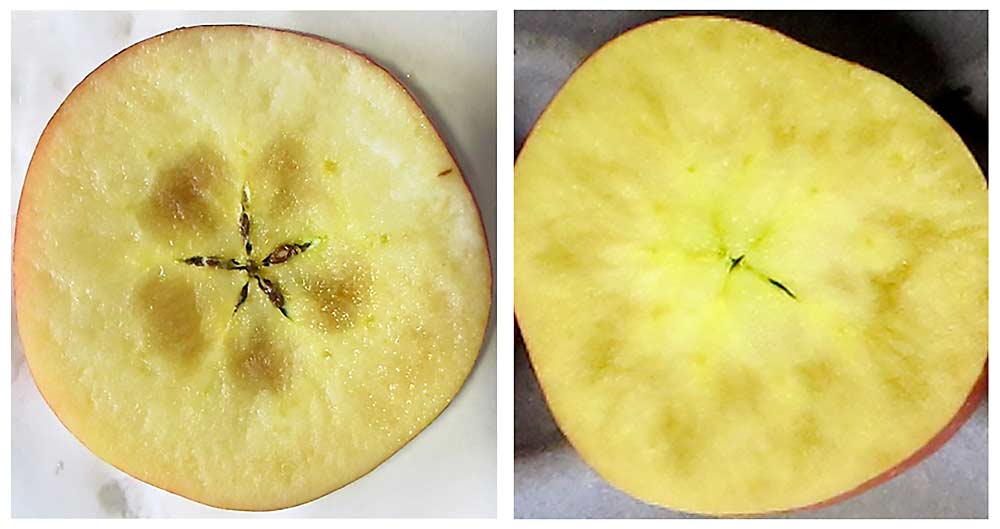
MAIA-1, the apple marketed as EverCrisp, keeps well in storage. But store any apple variety long enough and physiological disorders will begin to emerge.
Cornell University researchers Yosef Al Shoffe and Chris Watkins are studying EverCrisp’s storage characteristics, in particular its tendency to develop core and flesh browning. Based on their findings so far, they recommend storing EverCrisp fruit at 38 degrees Fahrenheit. And they don’t recommend using 1-methylcyclopropene (1-MCP), which results in the development of core browning.
“It seems pretty clear that 1-MCP is problematic after a certain point,” said Ryan Hess, grower services manager for Hess Bros. Fruit Co. “Storage temperature is important, too.”
Hess Bros., based in Lancaster, Pennsylvania, stores fruit for Pennsylvania and New York growers. The Hess team noticed EverCrisp’s tendency to develop internal browning in storage. Because most of their MAIA-1 apples come from New York, they asked Cornell postharvest researchers to study the problem, Hess said.
MAIA-1 is also susceptible to watercore at harvest and greasy skin, which can complicate fruit waxing. ReTain (aminoethoxyvinylglycine) can reduce watercore and greasiness, but it also affects fruit color. The Cornell researchers plan to conduct more studies to gain a better understanding of MAIA-1’s browning mechanism, as well as the effects of preharvest plant growth regulators like ReTain, Al Shoffe said.
In the initial study, funded by the U.S. Department of Agriculture’s National Institute of Food and Agriculture, they stored EverCrisp apples at 33 degrees and 38 degrees. They also compared 1-MCP-treated fruit with untreated fruit under each temperature regime. Storage at 33 degrees slowed fruit ripening and resulted in firmer flesh, but it also made the apples more susceptible to core and flesh browning. The use of 1-MCP at either storage temperature resulted in some development of internal browning, Al Shoffe said.
EverCrisp apples that aren’t treated with 1-MCP in storage are more likely to develop greasy skin. Storage operators are still figuring out how to manage that, Hess said.
The results suggest MAIA-1 is highly sensitive to injuries if stored at low temperatures, as is one of its parents: Honeycrisp. It might be because storage at 33 degrees and the use of 1-MCP markedly reduce the fruit’s ethylene production, which is part of its defense system and protects against free radicals that damage plant cells, Al Shoffe said.
The disadvantages of storing EverCrisp at 38 degrees are that it can result in greasier skin and lower flesh firmness. The level of flesh firmness, however, is still acceptable, even at seven months of storage without 1-MCP treatments, according to Al Shoffe and Watkins.
—by Matt Milkovich






Leave A Comment